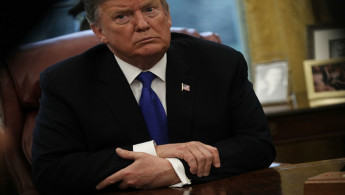US to keep Sudan on terror list 'until democratic transition'
The the country must change its leadership and policies, and the military must hand over power, Washington said.
“We will be willing to look at removing Sudan from the list of state sponsors of terrorism if there is significant change in the country’s leadership and policies,” the State Department official told Reuters.
Sudan was placed on the list under former US President Bill Clinton in 1993, cutting it off from financial markets in a move that strangled its economy.
The US has been slowly mending relations with Sudan after decades of tension, including over al-Qaeda chief Osama bin Laden's refuge in the country in the 1990s and an anti-rebel campaign in the western region of Darfur that Washington described as genocide.
President Donald Trump's administration lifted sanctions on Sudan in 2017 and has said that, in return for further progress, it would remove the country from its list of state sponsors of terrorism - a designation that has held back foreign investment.
Last week, President Donald Trump suspended efforts to normalise relations after the fall of veteran autocrat Omar al-Bashir, including the next round of talks scheduled for the end of April.
“It is important that the will of the people is respected, and that Sudanese people be allowed a peaceful transition,” the official said, adding that lifting the designation at this time was “out of the question” and restrictions remain in place.
Sudan offers a test case for the Trump administration which has criticised former president Barack Obama's response to Arab Spring protests against authoritarian leaders.
Trump has been comfortable allying closely with leaders with poor human rights records, including in Egypt and Saudi Arabia.
Chairman of the US-Sudan Business Council, Ihab Osman said Washington’s pressure on the military council would be crucial for Sudan’s peace process.
“We are not asking the United States to do the heavy lifting, or bankroll Sudan, but we need it to send the right signals,” Osman said.
Concessions
After months of widespread popular protests, the military on overthrew Bashir - just shy of 30 years in power - and set up a military council which it says will rule the country for the next two years.
Since the toppling of the long-saving President Omar al-Bashir on 11 April, the country's junta has been shaken by radical and swift changes, sometimes with concessions to protesters' demands.
Lieutenant General Awad Ibn Auf took the oath to become the head of the council on 12 April, but only to resign one day after amid mass protests calling for a civilian-led transitional administration.
The general was replaced by Lieutenant General Abdel Fattah al-Burhan, who vowed on Saturday to "uproot [al-Bashir's] regime", free detained protesters and hold talks with all political parties and groups that took part in the protests.
In the wake of this swift changes, Sudan's military council on Sunday announced a raft of concessions in effort to appease protesters calling for a civilian-led transition.
Shams Eldin Kabashi, the council's spokesman, vowed on Sunday to reform the feared National Intelligence and Security Service (NISS), one of the key demands from the political parties and movements that led the months-long protests.
In the midst of the tug of war between the generals and protesters who refused to leave the street until they see more concession, the country's foreign ministry urged on Sunday the international community to back the country's new military rulers to help "democratic transition".
Follow us on Twitter: @The_NewArab





 Follow the Middle East's top stories in English at The New Arab on Google News
Follow the Middle East's top stories in English at The New Arab on Google News


